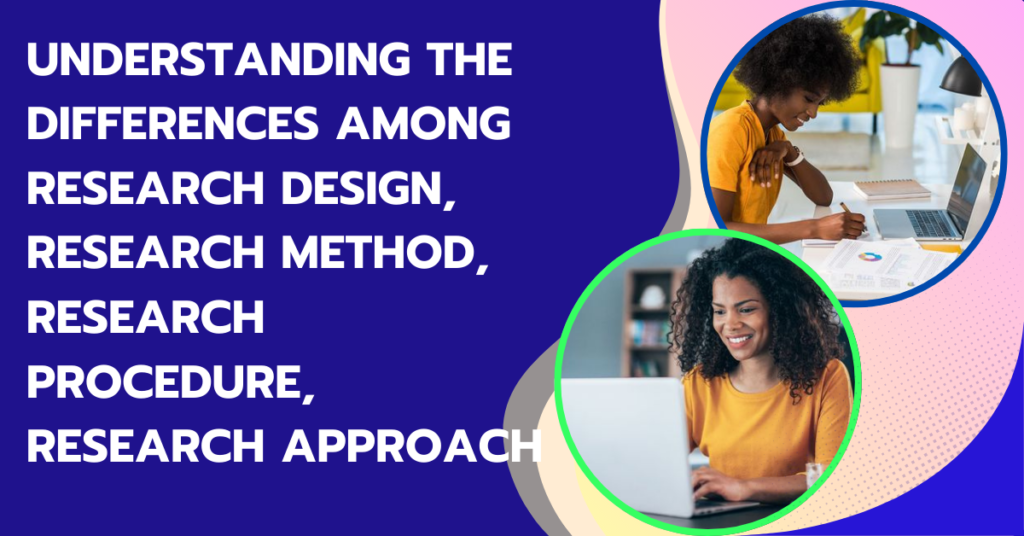 Menu
Facebook-f
Twitter
Google-plus-g
Menu
Facebook-f
Twitter
Google-plus-g
Understanding The Differences Between Research Design, Research Method, Research Procedure, And Research Approach

In the world of research, it’s essential to understand the various components that make up the research process. Terms like research design, research method, research procedure, and research approach are often used interchangeably, but they each have distinct meanings and roles in guiding your study. This guide will help clarify these concepts, explaining how they differ and how they work together in the research process.
- Research Design
Definition:
Research design is the overall plan or blueprint that guides the entire research process. It outlines the framework for collecting, analyzing, and interpreting data. The research design is like a roadmap that helps the researcher stay on course and ensures that the study addresses the research question or hypothesis.
Purpose:
The primary purpose of a research design is to ensure that the study is conducted systematically and that the findings are valid, reliable, and relevant to the research question. It helps in minimizing bias, ensuring that the results are a true reflection of the phenomenon under study.
Types of Research Designs:
- Descriptive Research Design: Focuses on describing characteristics of a population or phenomenon.
- Correlational Research Design: Examines the relationship between two or more variables without manipulating them.
- Experimental Research Design: Involves manipulating one or more variables to observe their effect on other variables.
- Exploratory Research Design: Used when the research question is not well-defined, aiming to explore a new area of study.
- Longitudinal vs. Cross-Sectional Design: Longitudinal studies collect data over time, while cross-sectional studies collect data at a single point in time.
Key Characteristics:
- Defines the research problem and objectives.
- Specifies the data collection methods and tools.
- Determines the type of data analysis to be conducted.
- Addresses potential biases and ethical considerations.
Example:
If you’re studying the impact of social media usage on students’ academic performance, your research design might involve a correlational approach, where you measure both variables (social media usage and academic performance) and analyze the relationship between them.
- Research Method
Definition:
Research methods are the specific techniques or procedures used to collect and analyze data. While research design provides the overall structure, research methods are the tools or strategies used within that structure to gather and interpret information.
Purpose:
The purpose of research methods is to provide a systematic way to collect data that is consistent with the research design. Methods can be qualitative, quantitative, or a combination of both (mixed methods), depending on the nature of the research question.
Types of Research Methods:
- Qualitative Methods: Include interviews, focus groups, observations, and case studies. These methods are used to gather non-numerical data and explore deeper meanings and experiences.
- Quantitative Methods: Include surveys, experiments, and statistical analysis. These methods involve collecting numerical data that can be quantified and subjected to statistical tests.
- Mixed Methods: Combine both qualitative and quantitative approaches to provide a more comprehensive view of the research problem.
Key Characteristics:
- Specific to the type of data being collected (qualitative or quantitative).
- Tailored to the research question and design.
- Involves tools like questionnaires, observation protocols, or statistical software.
Example:
Continuing with the social media and academic performance study, if your design is correlational, your research method might involve using a survey to collect data on students’ social media usage and their grades.
- Research Procedure
Definition:
Research procedure refers to the step-by-step process followed in conducting the research. It outlines the specific actions taken to carry out the research methods and ensure that the study is conducted systematically.
Purpose:
The purpose of the research procedure is to provide a detailed guide that ensures the research is conducted in a consistent, repeatable, and transparent manner. It includes all the practical steps, from selecting participants to collecting data, analyzing results, and reporting findings.
Components of Research Procedure:
- Participant Selection: How participants are chosen for the study (e.g., random sampling, purposive sampling).
- Data Collection Steps: The exact process for gathering data (e.g., administering surveys, conducting interviews).
- Data Analysis Process: The steps for processing and analyzing the collected data (e.g., coding qualitative data, running statistical tests).
- Ethical Considerations: Ensuring the study is conducted ethically, with informed consent and confidentiality.
Key Characteristics:
- Provides a clear, sequential outline of the research process.
- Ensures consistency and repeatability.
- Includes specific details about data collection, analysis, and reporting.
Example:
For the social media and academic performance study, your research procedure might start with selecting a sample of students, followed by distributing the survey, collecting responses, analyzing the data using statistical software, and then writing up the findings.
- Research Approach
Definition:
Research approach refers to the broader philosophical framework that underpins the research. It includes the researcher’s worldview, the theories that inform the study, and the overall strategy for integrating theory and practice. Research approaches are often categorized into deductive, inductive, or abductive reasoning.
Purpose:
The research approach shapes the entire research process, influencing the research design, methods, and procedures. It provides the theoretical foundation for how knowledge is generated and interpreted.
Types of Research Approaches:
- Deductive Approach: Starts with a theory or hypothesis and designs a study to test it. Commonly associated with quantitative research.
- Inductive Approach: Begins with observations or data collection and develops theories based on patterns that emerge. Commonly associated with qualitative research.
- Abductive Approach: Combines elements of both deductive and inductive reasoning. It involves forming a hypothesis based on incomplete observations and then testing it.
Key Characteristics:
- Determines the researcher’s perspective on knowledge and reality.
- Guides the formulation of the research question and hypothesis.
- Influences the choice of research design and methods.
Example:
If you approach the social media and academic performance study with a deductive approach, you might start with the hypothesis that increased social media usage negatively impacts academic performance and design your study to test this hypothesis.
How They Work Together
- Research Approach provides the philosophical foundation and guides the overall strategy.
- Research Design outlines the blueprint or plan for the study, ensuring that it aligns with the research approach.
- Research Methods are the specific techniques and tools used within the research design to collect and analyze data.
- Research Procedure details the step-by-step process followed to implement the research methods, ensuring that the study is conducted systematically and transparently.
Conclusion
Understanding the differences between research design, research method, research procedure, and research approach is crucial for conducting effective research. Each plays a unique role in the research process, and together, they ensure that your study is well-structured, systematically executed, and aligned with your research objectives. By clearly defining each component, you can design and conduct research that is methodologically sound and capable of producing valid and reliable results.




















Address List
- Makerere Hill Road, Ham Towers
- +256-703947778
- info@professionalwriters.shop
Social Networks
Links List
Professional Writers Inc.
Turning Ideas Into Reality
Online Academic Research Writing Training [Free]
JOIN NOW

